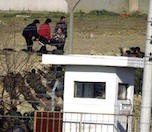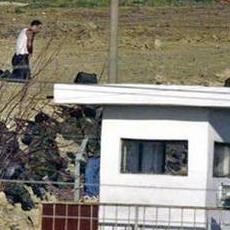Click to read the article in Turkish
In response to Bayrampaşa Trial related to the "Back to Life" operation, the National Security Council (MGK) responded to a question from the court related to the operation in 2000 in prisons killing at least 31 prisoners. But instead of the requested information, the council sent the court 29-year-old press statements.
MGK sent a reply to the court for the first time in this case.
However, the "documents" sent to the Bakırköy 13th Heavy Penal Court were four press statements, one dating back to 1994 and three to1996.
In the press statements dated December 28, 1994, March 22 1996, July 25 1996, and August 27 1996, it is stated that "the council was informed about the measures that should be taken for the solution of the problems" related to the prisons, which has no direct link to the Back to Life Operation.
"MGK's reply is funny, they are hiding the facts"
Güçlü Sevimli, a lawyer involved in the case, told bianet that the reply from the MGK Secretariat was intended to hide the facts.
"MGK wants the decisions of the council and the meetings to remain secret. They have given the court such a funny, frivolous reply that intends to hide the facts. The court has, in its request made to MGK, asked if there was a decision taken in the council related to the Back to Life operation. What they have sent is not a decision, but press statements. And those are not related with the operation, they date years back..."
"Prisons are always on MGK agenda"
Sevimli said that even if these press statements are irrelevant to the operation in question, they reveal how grave the situation is.
He said, "They have indicated that the problems in the prisons are discussed in MGK. However on the dates of these statements there were no actions or other kinds of "problems" in prisons. MGK has thus declared that they were examining the situation even when there is no event in the prisons. We understand from the press statements sent, that prisons have always been seen as a problem in MGK. I believe that the prisons were one of the main agenda items in MGK, especially in 90's, and until the operation. It is impossible that the "Back to Life" operation was not discussed at MGK.
"Not compatible with natural flow of life"
Sevimli said, "While MGK has the prisons on its agenda even when there is no event in the prisons, it is not compatible with the natural flow of life that it did not have the "Back to Life" operation which is the biggest operation to the prisons in the history of the Republic on its agenda."
Since it is impossible that MGK did not discuss and did not take a decision on the operation, the reply sent to the court is intending to misguide the court and to hide the facts says Sevimli and adds "This reply by MGK is not acceptable."
Court statements: "a state decision"
Sevimli said that the statements of top officials of the period at the court showed that a decision was taken in MGK.
He said, "Ali Suat Ertosun, the Director of Prisons and Detention Houses of the period has told that the operation was discussed in MGK already before at the court in previous hearings and we have requested the court to write to MGK based on these, three hearings before this one, and the court accepted our request."
"Ertosun has told the court in his statement that the operation was the decision of the state. Not only him, the suspects who stood trial in the case in the ranks of commander and colonel also made similar statements and even defended themselves saying 'they have implemented the decisions by the state.' Maybe Sadettin Tantan, the Interior Minister of the period who will be listened to at the court in the next hearing will also be similar."
Sevimli explained bianet why the inclusion of an MGK decision in the case file is very important.
It was one of the most important requests by the intervening lawyers in this case. However, until lately, the courts have always refused to write to MGK.
"This reply by MGK was given to the second question from the court. The reply to the first question from the court was that 'they could not find any documents.' The intervening lawyers requested the court to ask for a more detailed reply and the court sent MGK the second question. MGK has sent this reply to the second question but again has not given any information."
The next hearing of the case will be held tomorrow (January 26).
"Operation Back to Life"
During the week of December 19-26, 2000, 10,000 soldiers occupied 48 prisons to end two months of hunger strikes and "death fasts" by hundreds of political prisoners. The hunger strikers were protesting the state's plan to transfer its prisoners from large wards to the US-style "F-type" cells holding one to three inmates.
Operation Back to Life, which left at least 31 prisoners and two soldiers dead, lasted a few hours in most prisons, and up to three days at one prison. Eight prisoners reportedly "disappeared", and at least 426 prisoners were wounded.
The first lawsuit regarding "Operation Back to Life" conducted in Bayrampaşa Prison was filed in 2010, ten years after the incident.
The indictment against 37 private soldiers and two non-commissioned officers was filed by Eyüp Public Prosecutor's Office and the ensuing court case is continuing at the Bakırköy 13th Heavy Penal Court.
After the official document entitled "The Deluge (Tufan) Operation Order", according to which the operation was conducted in Bayrampaşa Prison, was submitted to the court, the second court case was filed against 157 members of the gendarmerie for "homicide" and "homicidal attempt" in March 2015.
Those who were affected or lost their relatives during the operation also filed complaints to ECHR.
Turkey was found guilty in the cases of İsmail Altun and Cuma Şat for "violation of the right to life" when authorities didn't treat the applicants in the aftermath of the operation.
On 10 December 2013, Turkey was convicted by ECHR in the case of 20 applicant women who were subjected to Operation Back to Life. (AS/PE)





.jpg)








